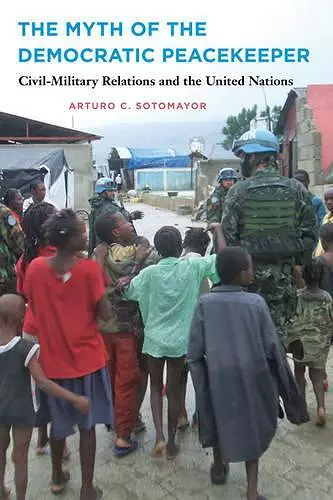The Myth of the Democratic Peacekeeper
Civil-Military Relations and the United Nations
Format:Paperback
Publisher:Johns Hopkins University Press
Published:24th Jan '14
Currently unavailable, and unfortunately no date known when it will be back

United Nations Peacekeeping Operations were long thought to have a uniform, salutary effect on participating soldiers from democratizing states. Sotomayor's penetrating, comparative study of Argentina, Uruguay and Brazil reveals instead how peacekeeping may simply reinforce customary practices, to the detriment of military professionalization and civil-military relations back home. This myth-shattering book will be the standard reference on Latin American peacekeepers for years to come. -- David Pion-Berlin, University of California, Riverside The Myth of the Democratic Peacekeeper carefully assesses one of the fondest hopes of UN peacekeeping: that the peacekeepers, once they return home, will bring with them the rule of law, democratic values, and the civil-military integration they sought to implement in the peacekeeping operation. Sotomayor's well-researched case studies of the peacekeepers from Argentina, Brazil, and Uruguay demonstrate that such hopes were and still are exaggerated. Peacekeeping leaves a civilianizing legacy, but not one as deep as the optimists hoped. -- Michael W. Doyle, Columbia University Finally, a book that effectively unpacks the black box of peacekeeping missions to explain how they impact the militaries that participate in them. Focusing on the major peacekeeping contributors from Latin America, Sotomayor challenges the assertion that participation in peacekeeping is always a good way to enhance military professionalism and civilian control of the military. His extensive participant-observation and interview work provide an empirically rich and nuanced portrait with important implications for achieving military reform in post-authoritarian democracies. A must-read, both for scholars who study the armed forces and for practitioners who see participation in peacekeeping missions of any stripe as a solution to the challenges of military reform. -- Kristina Mani, Oberlin College
It provides a novel argument about how peacekeeping works and further insight into how international factors affect domestic politics as well as how international institutions affect democratizing efforts.The Myth of the Democratic Peacekeeper reevaluates how United Nations peacekeeping missions reform (or fail to reform) their participating members. It investigates how such missions affect military organizations and civil-military relations as countries transition to a more democratic system. Two-thirds of the UN's peacekeepers come from developing nations, many of which are transitioning to democracy as well. The assumption is that these "blue helmet" peacekeepers learn not only to appreciate democratic principles through their mission work but also to develop an international outlook and new ideas about conflict prevention. Arturo C. Sotomayor debunks this myth, arguing that democratic practices don't just "rub off" on UN peacekeepers. So what, if any, benefit accrues to these troops from emerging democracies? In this richly detailed study of a decade's worth of research (2001-2010) on Argentine, Brazilian, and Uruguayan peacekeeping participation, Sotomayor draws upon international socialization theory and civil-military relations to understand how peacekeeping efforts impact participating armed forces. He asks three questions: Does peacekeeping reform military organizations? Can peacekeeping socialize soldiers to become more liberalized and civilianized? Does peacekeeping improve defense and foreign policy integration? His evaluation of the three countries' involvement in the UN Stabilization Mission in Haiti reinforces his final analysis - that successful democratic transitions must include a military organization open to change and a civilian leadership that exercises its oversight responsibilities. The Myth of the Democratic Peacekeeper contributes to international relations theory and to substantive issues in civil-military relations and comparative politics. It provides a novel argument about how peacekeeping works and further insight into how international factors affect domestic politics as well as how international institutions affect democratizing efforts.
A solid assessment recommended for military and political science holdings alike. Midwest Book Review Arturo Sotomayor's new book does something simple, original, and very important in peacekeeping scholarship. Instead of examining what peacekeepers do or do not do in the field, and whether or not they are successful, Sotomayor looks through the other end of the telescope, to examine the countries that contribute those peacekeepers to UN missions... Sotomayor's book has set the nascent subfield of peacekeeper contributor studies on a firm and intellectually rigorous footing. His book is to be highly commended to anyone interested in the changing dynamics of global militarism, the international use of force, and the unintended consequences and paradoxes of liberal internationalism. -- Philip Cunliffe H-Diplo With its different focus, [The Myth of the Democratic Peacekeeper] is a welcome addition to the literature, and its conclusions should give pause for thought. -- Astri Suhrke International Peacekeeping A careful, systematic, and ultimately persuasive critique... Ultimately, Sotomayor does just as much to expose the quandary of peacekeeping as he does to highlight the contingent effects of peacekeeping. -- Craig Arceneaux Political Science Quarterly The argument and evidence in The Myth of the Democratic Peacekeeper significantly advances understanding of the effects of participation in peacekeeping on civil-military relations in sending countries... This book represents a significant contribution to a growing strand of literature... The insights in The Myth of the Democratic Peacekeeper should inspire further scholarly work in this important area. -- David E. Cunningham Perspectives on Politics
- Winner of Luciano Tomassini Latin American Relations Book Award 2015 (United States)
ISBN: 9781421412139
Dimensions: 229mm x 152mm x 17mm
Weight: 386g
280 pages